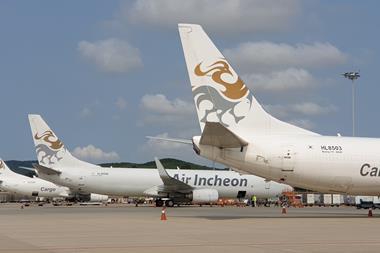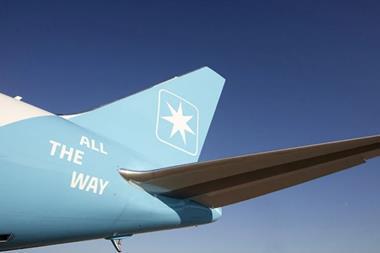Shippers are expected to increasingly create their own air cargo networks as they look to enhance the control they have over their supply chains.
Speaking at the Air Cargo Europe event in early June, Atlas Air Worldwide executive vice president and chief commercial officer Michael Steen said that the rise of e-commerce meant that shippers were looking to secure access to transport capacity throughout the year.
Atlas Air has itself benefitted from this trend and recently announced a B747-400F charter programme with a high-tech company, while it also operates over 20 aircraft for e-commerce company Amazon.
An Atlas investor presentation on its website also names Inditex as another shipper customer.
Explained Steen: “It is a matter of making sure that [shippers] have control of their supply chain so they can move products from A to B.
“It is happening in many industry segments, and it applies to shippers that want to have access to capacity at any given time.”
Steen said that in the past shippers only occasionally required extra capacity, for product launches or production line stoppages, for example.
However, the rise of e-commerce and associated special sales events have created spikes throughout the year, while products are also now sold through several channels, not just shops on the high street.
Customers are also demanding faster delivery of goods, which can be better achieved through a dedicated network.
Steen says that other areas of the air cargo sector are also benefitting from the trend.
“We are seeing increasing demand from shippers and our customers are seeing that as well, for example in combination with one of our freight forwarding intermediaries, for whom we are also flying aircraft, like Panalpina.
“We are well spread and diversified when it comes to that, so if we see adjustments or changes in the market place and demand in a certain area, we can pivot accordingly.”
On the traditional air cargo market, Steen says that demand has slowed this year, but Atlas is sheltered to an extent because it also caters for the e-commerce and express industries, which continue to grow.
“What we are seeing now is a slowing down of demand in the general cargo sector, not necessarily in express and e-commerce - that is continuing to grow,” Steen said.
“It is an interesting parallel because you have increasing consumption at the same time as you have overarching economic concerns.
“The other interesting question is, of course, what if there is no trade agreement between the US and China, but consumption continues to increase, what will happen to production?
“Is manufacturing going to be moved from China to other places in Southeast Asia? That would not be the end of the world for Atlas because it would present a tremendous opportunity - we can move our assets to where our customers take demand.
“So with our diversified strategy over the different product lines and our five fleet types [B737, B757, B767, B777, B747], I think that we are in a good position to navigate through any downturn in the market as well as capitalise on upturns.”
He pointed out that today, e-commerce has a penetration rate of around 12% globally, including streaming media, leaving plenty of room for growth in this sector.
Atlas has benefitted from demand for charter services during the peak season over the last couple of years.
Steen said that charter demand has been good so far this year through its ongoing activities for sports like Formula 1 and Moto GP, while it also has deals covering the peak season with express companies FedEx and UPS to supply them with extra capacity.
“I think general cargo wise we are going to see a solid peak,” he added. “How it plays out is going to be dependent on what happens here this summer that will force the market to go one way or the other.”
On fleet, Steen says that the Atlas group has now hit 123 aircraft – including 11 currently scheduled to be added in 2019 – of which it will operate 114. The aircraft are spread out over three operating airlines, Atlas, Polar and Southern, and its dry-leasing company Titan.
“That is what the fleet looks like now, what it will look like at the end of the year, we will see,” said Steen.
“We are going to analyse opportunities that come up and maybe capitalise on some of that.
“If you look at our growth trajectory over the last several years you can see how we have expanded operations since 2009, when we had 28 aircraft.
“Over the last five years, we have been adding around 13 aircraft on an annual basis, which is in essence starting up a small airline every year.
“Diversification for us is a key strategic word. Diversify the customer base, diversify the product offering, diversify the fleet and we are going to continue in that way.”















